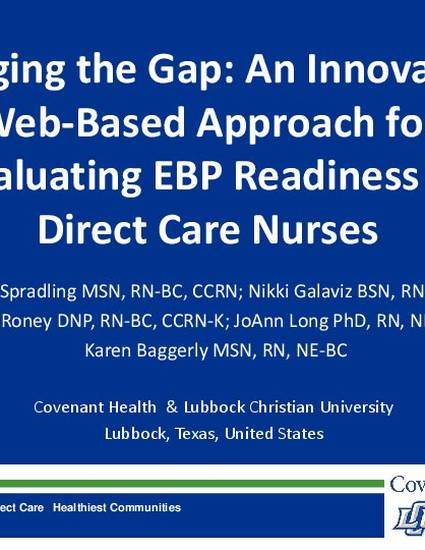
The provision of universal and equitable access to safe and effective healthcare emphasized in The 2012 World Health Report, 'no health without research': The endpoint needs to go beyond publication outputs, has forwarded the global evidence-based practice (EBP) movement (Zachariah et al., 2011). Notably, Lindeman (1975) identified research utilization and quality improvement as nursing priorities over forty years ago. Yet, current literature suggests research findings may take seventeen years to reach practice integration (Morris et al., 2011). Notably another dilemma added to the challenge is approximately 80% of current nursing practice does not reflect evidence-based nursing decisions (Conner, Dwyer, and Oliveria, 2016). Peer reviewed literature report direct care nurses self-identify lack of resources, time, and critical appraisal skills to navigate current literature (Yoder et al., 2014). Proficient skills of direct care nurses to acquire and appraise existing studies can be the catalyst translating scientific knowledge to the bedside; however, an understanding of the baseline knowledge and readiness of front-line providers is limited. Organizations worldwide are challenged to overcome these self-reported barriers to implementing and adopting research findings into clinical nursing practice. The purpose of this research study was to determine the self-perceived online research and critical appraisal skills and the EBP readiness and knowledge of front-line nurses from three care facilities in the southwest United States.
Methods: A cross-sectional exploratory descriptive design was used in this study. The Stevens EBP Readiness Inventory and EBP Knowledge Assessment questionnaires were used to assess direct care nurses’ self-reported evidenced-based readiness and baseline EBP knowledge. Research skill was measured using four questions adapted from the Research Readiness Self-Assessment tool. Informed consent was obtained from (N=49) Registered Nurses volunteering to participate. The survey questionnaires were administered online to nurses volunteering to participate from 22 nursing units during a 3-week period in May 2017.
Results: Demographic, descriptive, and frequency distributions were examined.Front-line nurses expressed the highest level of self-confidence in four questions pertaining to the area of use and implementation of clinical practice guidelines. The study data were analyzed using SPSS version 25. The highest area of perceived evidence-based practice readiness was ability to “deliver care using evidence-based clinical practice guidelines” with a mean 4.5, SD, 1.55; “use of agency-adopted clinical practice guidelines”, mean, 4.29, SD, 1.60; “choose evidence-based approaches over routine as a base for own clinical decision making”, mean 4.2, SD, 1.60; and “participate in evidence-based quality improvement processes to evaluate outcomes of practice changes”, mean, 4.02, SD, 1.49. In comparison, the lowest areas of self-confidence for evidence-based practice centered on a range of topics reflected in three questions reflecting the ability to assess the “major facets to be assessed when using clinical practice guidelines”, mean, 2.77, SD, 1.18; “ability to identify statistics commonly used in evidence summaries”, mean, 2.96, SD, 1.18; and “ability to conduct expert search strategies using pre-constructed strategies in major databases”, mean, 2.67, SD, 1.21. The remaining 14 questions assessing evidence-based practice readiness ranged from a low mean score of 3.02 – 3.69, reflecting scores falling approximately half-way between having “very little” to having a “great deal” of evidence-based readiness.
Conclusion: While front-line nurses reported high levels of self-confidence for using EBP to implement and deliver care using clinical practice guidelines, they also expressed lower knowledge and self-efficacy with use of more advanced EBP skills. Strengthening nurse online search skills was identified as the most important learning deficit in this sample of Registered Nurses. Limitations of this study included a voluntary and relatively small sample size and cross-sectional design. Findings from this study helped identify objective data to guide focused organizational education efforts to improve direct care nurses’ use of EBP and research concepts necessary to integrate research into clinical practice.
Available at: http://works.bepress.com/jamie-roney/24/

Podium Presentation